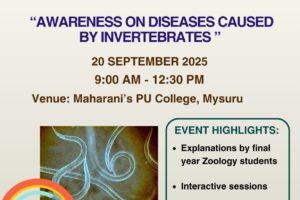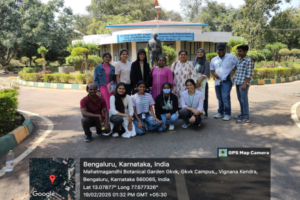
REPORT ON VISIT TO KARNATAKA STATE POLLUTION CONTROL BOARD
An institutional visit was organized by the Department of Zoology for final-year B.Sc. students to the Karnataka State Pollution Control Board (KSPCB) located at Hebbal Industrial Area, KRS Road, Metagalli, Mysuru . The visit was conducted in two slots to accommodate 29 students: Batch I on 13 March 2024 and Batch II on 16 March 2024, both between 10:00 AM and 01:00 PM. The students were accompanied by two faculty members.
The Karnataka State Pollution Control Board (KSPCB) was constituted under the Water (Prevention and Control of Pollution) Act, 1974, and later empowered under the Air (Prevention and Control of Pollution) Act, 1981, as well as the Environment Protection Act, 1986. The Mysuru regional office monitors industrial discharges, manages hazardous waste compliance and oversees air quality through continuous ambient air quality monitoring stations (CAAQMS). It works closely with industries, municipalities, and academic institutions to promote sustainable development. The board also plays a vital role in public awareness and environmental education.
Objectives of visit
- To provide students with practical exposure to air quality monitoring systems.
- To observe and understand the assessment techniques for particulate matter and other air pollutants.
- To enhance students’ understanding of pollution control technologies and their importance in environmental protection.
- To introduce students to the functions and responsibilities of regulatory bodies like the Karnataka State Pollution Control Board.
- To create awareness about career opportunities in environmental science, pollution monitoring, and regulatory agencies.
The students were warmly welcomed by the KSPCB staff and taken on a guided tour of the facility. They attended an orientation session that introduced them to the board’s organizational structure, key functions, and the scope of environmental issues managed by the Mysuru office. They were then shown the air quality monitoring station, where they were introduced to equipment used to analyze atmospheric pollutants, including particulate matter, sulfur dioxide (SO₂), nitrogen oxides (NOx), carbon monoxide (CO), and other indicators.The students witnessed a live demonstration of air sampling and pollutant analysis procedures, along with the data recording and reporting methods. Students actively participated in the discussion, asking about seasonal variations in pollution levels, pollution mitigation strategies, and the role of local communities in environmental conservation. As part of the visit, students were also given the opportunity to observe and note down live air quality data. This data was collected for further analysis in the college laboratory to reinforce their understanding through post-visit discussions and practical assignments.
Conclusion
The visit to the Karnataka State Pollution Control Board provided an invaluable experiential learning opportunity for final-year Zoology students. It enriched their academic understanding with real-world insights into environmental regulation and pollution management. The students gained awareness of how air quality monitoring contributes to public health and ecological stability. The interaction with KSPCB officials inspired many students to consider careers in environmental research, policy, or regulatory affairs.










